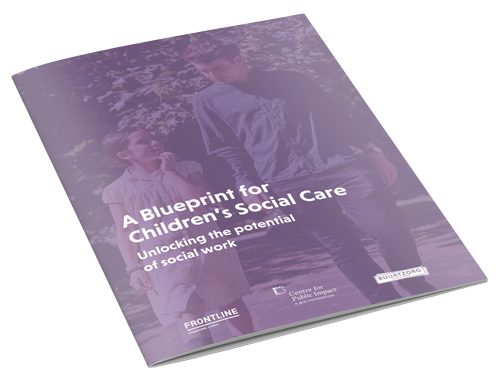
10 Things We’ve Learned and Believe in after delivering 5 years of Public Sector Design Training


'A bureaucratic environment, with excessive layers of management, built on mistrust' - children's social care needs meaningful changes.
Share article.@CPI_Foundation @FrontlineSW & @BuurtzorgBI have teamed up to explore a new approach to children's social care, putting relationships first
Share articleThe 'Blueprint for Children's Social Care' is a collab of our work with +80 professionals from the sector, proposing a radical restructure.
Share articleWe put our vision for government into practice through learning partner projects that align with our values and help reimagine government so that it works for everyone.
In England today, some 700,000 children lack a safe or stable home - and this number is on the rise. For these children, social workers play a crucial role in laying the foundations for a better future. It is the quality of the relationships that social workers build, and their skill in navigating these relationships, that can really make a difference to children and families' lives.
However, too many things get in the way of social workers' ability to do their best work with families. They work in a bureaucratic environment, with excessive layers of management and oversight, built on a culture of mistrust of the social worker. These problems are far from new. The last 10 years have been bookended by different governments trying to find a way through this, as well as by many local authorities striving for meaningful change. Unfortunately, significant impact has yet to be made.
“We need to move the balance of time and effort from bureaucracy to practice.” - Ruth Allen, CEO, British Association of Social Workers
Today, we are pleased to announce a new blueprint for social care developed hand-in-hand with the social workers who know best how to meet the needs of England's most vulnerable children.

Children's social care represents one of the most high risk areas of public services - giving the right support to children and families is essential to help them thrive. Nevertheless, systemic issues exist in the sector that are preventing social workers from doing their best work for children and families. These issues include:
Work being too bureaucratic: a Department for Education (DfE) survey reported that social workers spend 29 hours a week on a computer or doing paperwork, accounting for 65% of the average working week
Excessive layers of management: One in three social workers in the children's social care system are not working directly with children and families, but are instead working within one of the three to five layers of management present in local authorities.
Overbearing insight: Children's social care is gripped by a command-and-control culture. This has created an excessive focus on data that is removed from the actual work and yet is too simplistic to reflect the complexities of family life.
As a result of these issues, as well as funding cuts, local authorities are trying new ways to better deliver their social services. Many local authorities have pioneered innovative approaches, but there is a wide consensus amongst system leaders that this is not enough.
“Currently, it's so frustrating when I can't make a decision which I know will be a good thing for the family I am working with.” - Newly qualified social worker in blueprint focus group
The Centre for Public Impact (CPI) has been exploring a new model for government - one where power is shared and that values subsidiarity in decision-making, new approaches to accountability, putting relationships first, and building a culture of continuous learning. Buurtzorg, a Dutch home care organisation that empowered nurses to make decisions about their patients, is a good example of this principle in action.
The Centre for Public Impact (CPI) has been exploring a new model for government - one where power is shared and that values subsidiarity in decision-making, new approaches to accountability, putting relationships first, and building a culture of continuous learning.
Inspired by these ideas - and after seeing Buurtzorg in action earlier this year - a group of children's social workers and system leaders came together and started asking questions. How might we be able to apply this relationships-first approach to children's social care in England? What would a local authority look like if it were to change its structures to better enable and empower social workers to support children and families?
CPI, Frontline and Buurtzorg UK and Ireland teamed up to explore the answers to these questions. Working with over 80 professionals from across the social worker sector, including many social workers and system leaders from local authorities, we'd propose restructuring the way social care is administered using the following model:
Challenged to radically redesign the children's social care system using existing budget and resources, we tested our approach with one local authority, using their existing system as a case study. We found that if the local authority were to transition, we would see:
The potential for social workers to spend c.60% more time with children and families due to reduced travel and fewer administrative tasks;
A more than 20% reduction in average caseloads by creating 30 new practising social worker roles (as former Deputy Team Managers and Team Managers now hold cases);
A c.50% increase in the amount of time available for supervision; and
Social workers who are empowered to make decisions for children and families, while maintaining access to support, expert advice and supervision via their peers and the Insight Team.
“We need to change the culture and structures within which social workers do their work. Trust needs to be woven into the fabric of the social care system, from how we work with families to how we work with each other internally and organisationally.” - Ryan Wise, social worker
We now have a blueprint for a radically different approach to children's social care that could produce better outcomes for children and families. With thousands of social workers passionately committed to doing the best work they can for children and families, it's time to act. We're keen to hear from local authorities who might be interested in working with us to pilot this approach.
If you're interested in piloting the model or joining the conversation about how the ideas of shared power can transform the sector you work in, get in touch with Katie Rose.











